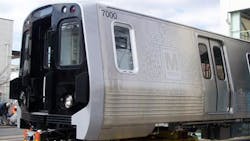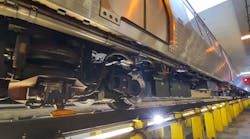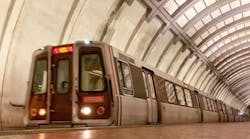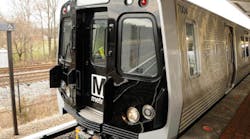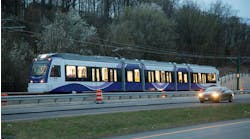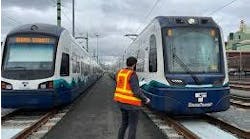The Washington Metropolitan Area Transit Authority (WMATA) is pausing the return of its 7000-series railcars to service and WMATA General Manager and CEO Paul J. Wiedefeld has ordered a new daily inspection regime for those cars that have been put back into service.
WMATA’s chief safety officer and chief operating officer, in consultation with Transportation Technology Center, Inc. (TTCI), moved to nightly inspections of the 7000-series cars back in service “in an abundance of caution” that nightly inspections would be “the prudent course of action.”
“While I recognize the pause is unexpected, we are going to continuously evaluate data we are collecting to ensure that we are enhancing safety,” Wiedefeld said. “I feel that requiring a daily inspection is the safest course until we know more and our experts have an opportunity to review the data we are collecting with the few trainsets now in operation.”
WMATA’s original plan called for the metered release of no more than 336 of its 7000-series cars back into service. The authority has cleared 210 of those cars to re-enter service before the updated plan to inspect the wheelsets nightly was implemented. The number of those cars that will be active on the network is dependent on how many can be inspected overnight. WMATA’s 7000-series cars operate in eight-car trains and the authority says it takes approximately three hours to inspect the wheelsets of a single train.
The 7000-series vehicles (748 cars, approximately 60 percent of the entire railcar fleet) were removed from service following an Oct. 12 derailment. An initial investigation by the National Transportation Safety Board (NTSB) found the railcar involved in the incident had a wheelset that was out of compliance with specifications. The NTSB continues its investigation into the derailment and has not determined a probable cause.
Locally, the removal of the railcars from service caused service impacts as the authority inspected every wheelset and developed a plan to return the cars to service. The plan received approval of the Washington Metrorail Safety Commission in mid-December. Nationally, the NTSB and the Federal Transit Administration recommended passenger rail operators and rail transit agencies assess wheel gauge specifications and take immediate corrective action.
WMATA is utilizing the expertise of TTCI in its root cause analysis of the derailment. The authority also notes it has informed NTSB and the Washington Metrorail Safety Commission of its updated plan to inspect the 7000-series railcars nightly and pause additional railcars from re-entering service.

Mischa Wanek-Libman | Group Editorial Director
Mischa Wanek-Libman is director of communications with Transdev North America. She has more than 20 years of experience working in the transportation industry covering construction projects, engineering challenges, transit and rail operations and best practices.
Wanek-Libman has held top editorial positions at freight rail and public transportation business-to-business publications including as editor-in-chief and editorial director of Mass Transit from 2018-2024. She has been recognized for editorial excellence through her individual work, as well as for collaborative content.
She is an active member of the American Public Transportation Association's Marketing and Communications Committee and served 14 years as a Board Observer on the National Railroad Construction and Maintenance Association (NRC) Board of Directors.
She is a graduate of Drake University in Des Moines, Iowa, where she earned a Bachelor of Arts degree in Journalism and Mass Communication.
